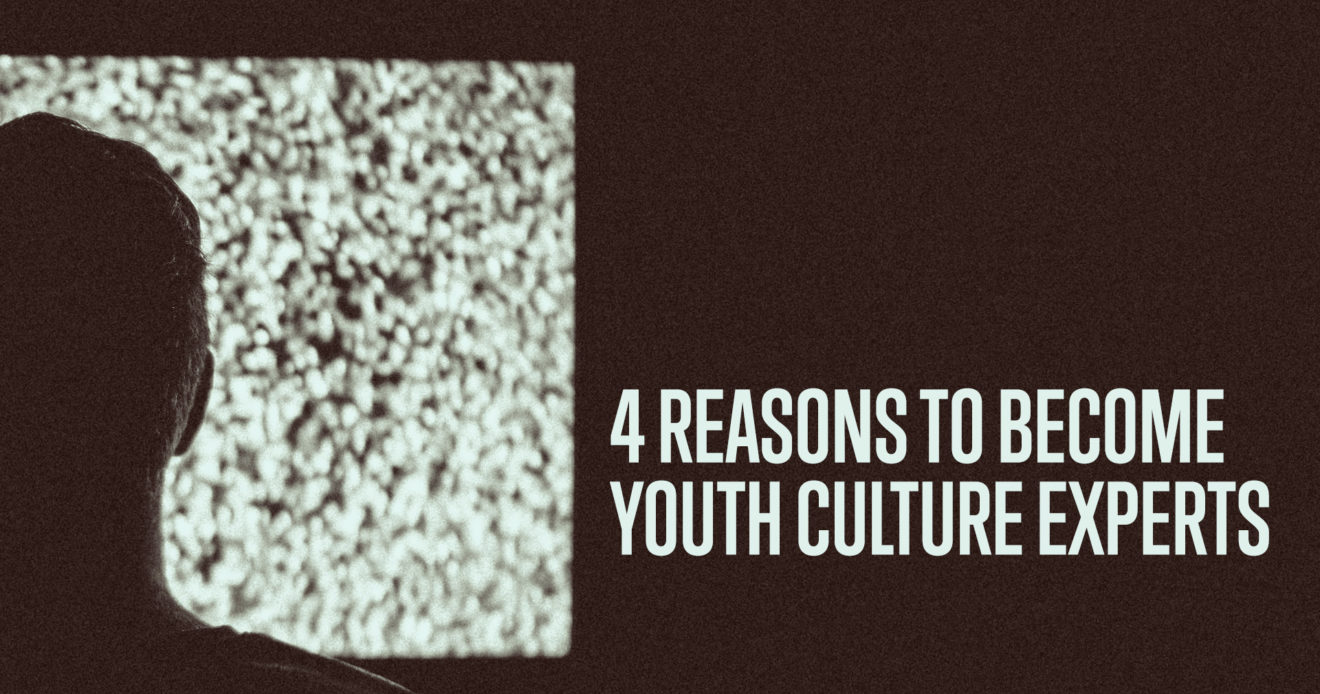
4 Reasons To Become Youth Culture Experts
So how many of you have seen Netflix’s 13 Reasons? How many of you knew that Katy Perry had a new album coming out? Did you listen to it? Did you think about how her lyrics reflect an all too familiar commentary on youth culture? As youth leaders, we walk a fine line between knowing just enough culture so we don't seem out of touch, but not so much that we send the wrong message. But maybe you are just like my beautiful wife, who would much rather listen to worship music all day and shut out the world and be perfectly content with being out of touch. But as our kids are growing up, making new friends, and experiencing new things; she is continually aware that she cannot control everything for them. The time is coming when she will have to become a cultural expert to help our own kids navigate the world they are entering.
Recently I was given a copy of A Practical Guide to Culture: Helping the Next Generation Navigate Today’s World by John Stonestreet and Brett Kunkle. I was asked to review it, but my wife grabbed it first. So I let her read it. Then I asked what she took away from it. Here are some of her thoughts.
Culture is about what we do with creation because we have been charged to care for it.
There is one thing that God did not create. He didn't create culture. God created everything we can see. Every tree, rock, plant, the atmosphere, the universe, and humanity. But he left the creation of culture up to us. After God had created humanity, he gave them a task. He told them to multiply and care for creation. Essentially he told us to create culture. The cultures that we live in are a reflection of what people have decided to with Gods gift of creation.
Our students have an incredible opportunity. They have the choice to let culture impact them or embrace their responsibility to influence culture and create change for the good. But as a teenager, they don't yet have the skills to navigate culture to fulfill Gods call to build a world that reflects him. But they won't get the skills unless we teach them. But to teach them, we need to know the culture they live in. We need to constantly work to be experts in what students are confronted with daily, the temptations, and the messages being broadcast to them.
Our salvation is about more than just from something to something.
Of course, it is a great thing to remind students of their sin, their need for Christ, and what belief in him means for the life to come. Jesus has saved us from idolatry, our desire, and ourselves to do things our own way. But what does our salvation mean for this life now? Think about the last time you were blessed to be able to lead a student to Christ, what do you tell them came next? Salvation is from our sin, but it is also to a mission. It is a mission to enter the world. It is a mission to take the gospel back into a sinful culture, not run from it and we are called to live in that tension between good and evil.
A few years ago I was blessed to lead a student to Christ. I have to admit, the best part was not introducing her to Jesus or to even see the Holy Spirit work in her life. Actually, the best part was her motivation to re-enter her world—a broken and torn family—and preach the gospel to anyone and everyone she knew. The problem with that is it would mean she would have to re-enter the sinful culture that raised her. Before Christ, it was all she ever knew, and if she wasn't properly prepared, she risked that corrupt way of life regaining its foothold on her.
If we, as youth leaders and parents are not actively engaged in youth culture, how can we help students discern what they can and cannot handle? We must walk alongside them, help prepare them, and then send them.
Our kids are overloaded with information and need help navigating it.
Students today, have a greater amount of information at their fingertips than any generation before them. The days of parents, teachers, and pastors as life’s experts have been replaced with Google. We have become a culture of instant communication, information overload, and on-demand everything. For most parents and youth leaders, the reality of owning a cell phone was a post-college experience. Now it is not all that unusual to see middle school (or younger) students with not just a mobile phone, but a smartphone. How can such a young mind navigate instant communication and information without some kind of mentoring or coaching?
Culture is what is shaping the lives of our students whether we recognized it or not.
When I was a Christian educator, so many of my students complained that they were just being sheltered. And to that I said, Yes you are! That is precisely what Christian schools, youth groups, and even the home is trying to do. Shelter our kids. It is the parents (and other adult leaders) responsibility to ensure that their children are prepared to engage the world for the gospel. Soldiers go to boot camp before going to war, students are adequately trained in college before starting a career, even young drivers need to be properly trained and tested before venturing out on the road on their own. So then why would we send students into the world unprepared for what is waiting for them?
But here is the challenge. Every time a student goes online, leaves the house, is at school, hanging with friends—in fact, every time they pull out their cell phone, western culture is working overtime to shape and influence their lives on every level. No matter how many shelters or training camps we create, we can't prevent it—even if for a time. So what we know about culture and how we teach students is more important than ever.
I get it. This means we will have to watch things we might not want to. I didn't really want to binge watch 13 Reasons, but I did, so I knew what all the fuss was about. There are plenty of movies, books, YouTube videos, and social media platforms that I would much rather ignore. But as someone who walks alongside youth, I make it part of my ministry to be informed. Not to promote it, but to help students navigate it.
As you consider these things, I recommend you grab a copy of, A Practical Guide to Culture: Helping the Next Generation Navigate Today’s World . The authors do an excellent job of breaking down the complexity of culture, why we should engage, along with some practical application. This book is a must read for all parents and youth pastors. Period.
Steve Kozak
Executive Director of AwanaYM
Steve currently serves as the Executive Director of AwanaYM. Previously, Steve spent over a decade teaching high school theology and apologetics from Detroit to LA. Steve holds a Masters degree in Theology from Moody Theological Seminary and a Masters in Christian Apologetics from Biola University. Steve is also an adjunct professor at Trinity International University. He speaks and writes on youth ministry, youth culture and apologetics. He resides in Chicago, IL with his wife and four children.FollowSteve Kozak on Twitter: stevenmkozak
Comments
Get the AwanaYM Update
Receive youth ministry resources in your inbox. Subscribe today!
